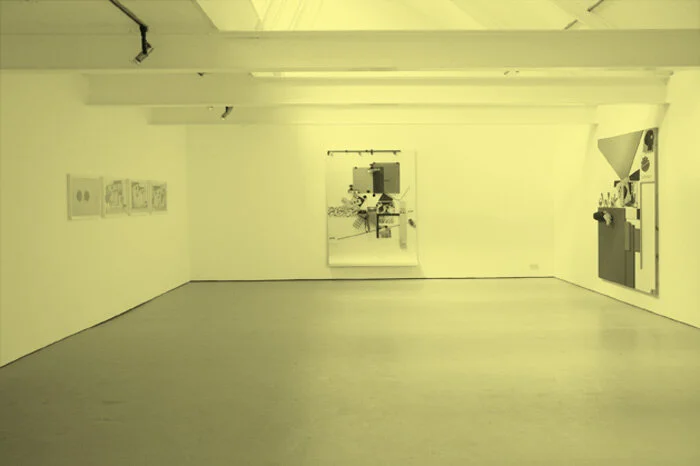#80 Anthony Green, How Can We Carry On?
2 - 21 September
Anthony Green was born in Welwyn Garden City. He studied Painting at Chelsea School of Art between 1993 and 1996. Anthony currently lives and works in London.
Press Release.
A conversation between Samuel Jeffery and Anthony Green
Samuel Jeffery: I wanted to start by talking about the manner in which the three large panels, (The Weekend, Things Can Only Get Better, Christopher Williams and Work and its Public Relations) and their components are crafted. Small highly rendered painted aspects sit along side less sophisticated found objects - fake vegetables and CD cases. Could you talk a little bit about this mélange of materials and techniques and why it is important that they operate side by side?
Anthony Green: For me the panel compositions function by relationships in between these various means, materials and images of representation. I think of the various segments in terms of their intensity and I'm interested in attempting to produce a change in level of intensity or sensation in between the segments. Also it's obviously a fetishisation of the aesthetic be it a cable clip, a ten pound note or the quality of a painted surface.
SJ: These shifts in the levels of what you call ‘intensity’ and the inconsistent means of representation within the panel works, subject an audience to a sense of uncertainty and indetermination. For instance, included in Christopher Williams, the work on the back wall, is a flyer for your 1996 Chelsea degree show that contains your name. Within the same work is a CD album cover by the musician ‘Anthony Green’, perhaps the artist, perhaps not. These conflicting modes of representation offer us with a misdirected impression of the artist and his agenda. Why do this?
AG: It’s not a question I’m going to be able to answer very concisely, I guess because they are gestures or decisions that are made with a fair bit of uncertainty and indetermination and committed to with a sense of the risk of them being bad ideas. However it’s obviously a tactic that has endured for me. I’m interested in the question of agency and theories of identity in which a sense of doubt or uncertainty are important – a vision of identity as a cracked mirror of divergent forking paths. The starting point of this work - the theme of identity and the self portrait - feels a little stupid or dumb and even shameful but in making the work I have tried to shamelessly indulge my aesthetic taste and for example joy in copying. The presence of names in the work is influenced by ideas about the use of the proper noun in the act of naming an event like a storm or battle. I like the convergence of the specifically personal and the impersonal when such ideas about names, a geographical conception of identity are applied to people – a kind of psychologically charged emptiness. Ultimately this is my interest in identity – identity as an event. I think of the process of my work, as an attempt to locate myself at the cutting edges of this event, which is the threshold of my knowledge and ignorance.
SJ: Yes, I like what you say about the dumbness of making work about identity, especially your own. Could you perhaps talk a little bit about the drawings and their relation to art history – namely an idea of the avant garde and abstraction.
AG: Well I certainly don’t think of myself as an original thinker but I consider it a task of the work to attempt to produce the new, even if this is perhaps a more complicated, less clear cut or subtle affair then it sometimes seems from the point of view of art history. To put it in other terms, my ambition for the work is the production of the asignifying from the redundancy of the signifying. I’m not sure I have much to say about abstraction, the specific artists or work that the drawings have relationships with, other than, if the work shows signs of nostalgia for periods rich with possibilities, it's just a little melancholic yearning - characteristic of our times - for futures that are lost. Maybe it’s revealing of the drawings tone to say I have a very productive relationship with art history, it’s without guilt or anxiety and my work is not commentary or made with ironic intentions. Perhaps it comes back to the question of agency or sincerity? Most importantly for me, what the drawings and my means of composing take from a history of art, is drawings capacity to use the manual as a creative motor, a means of non thought.




